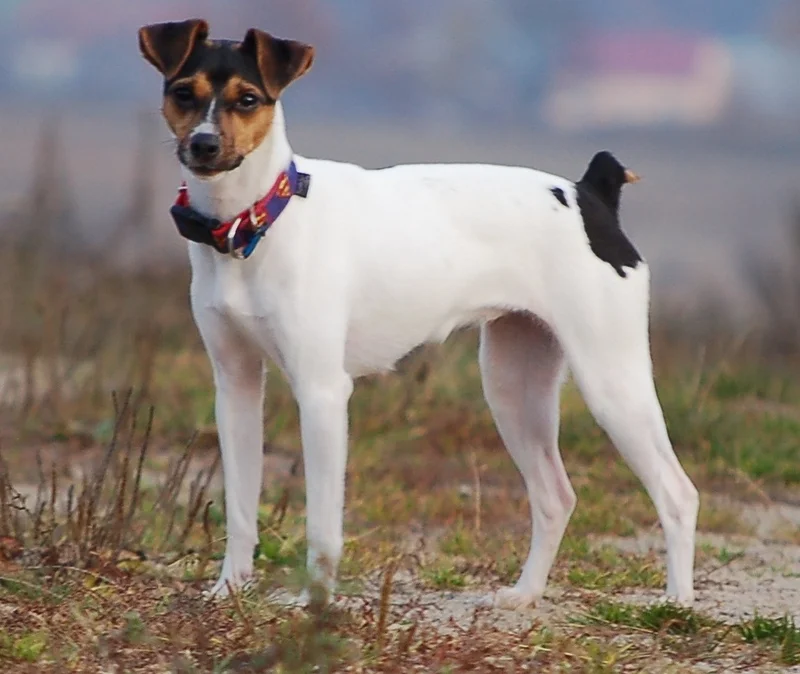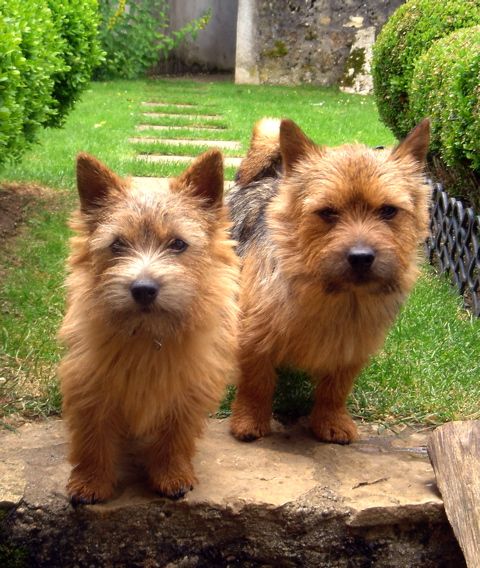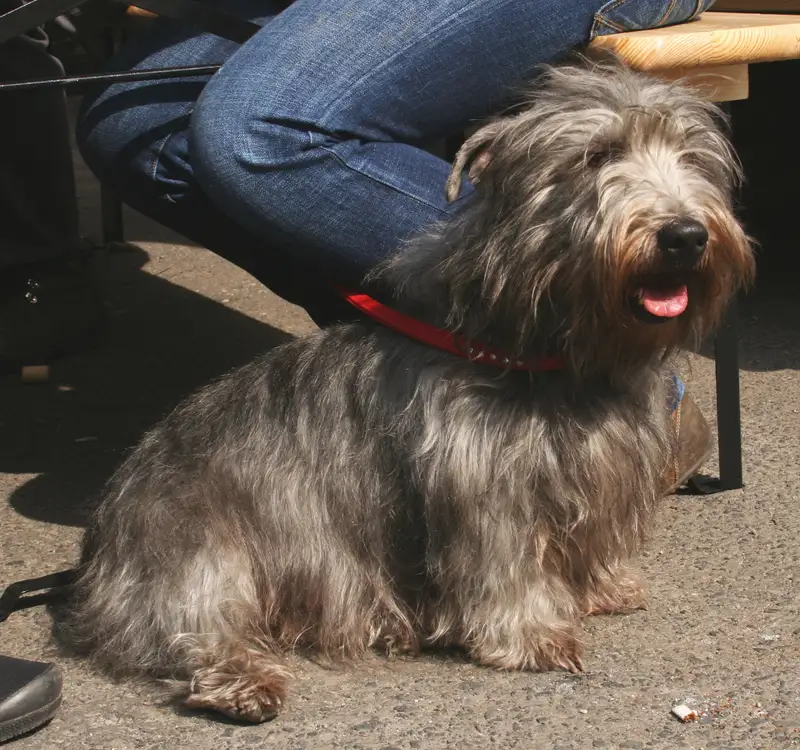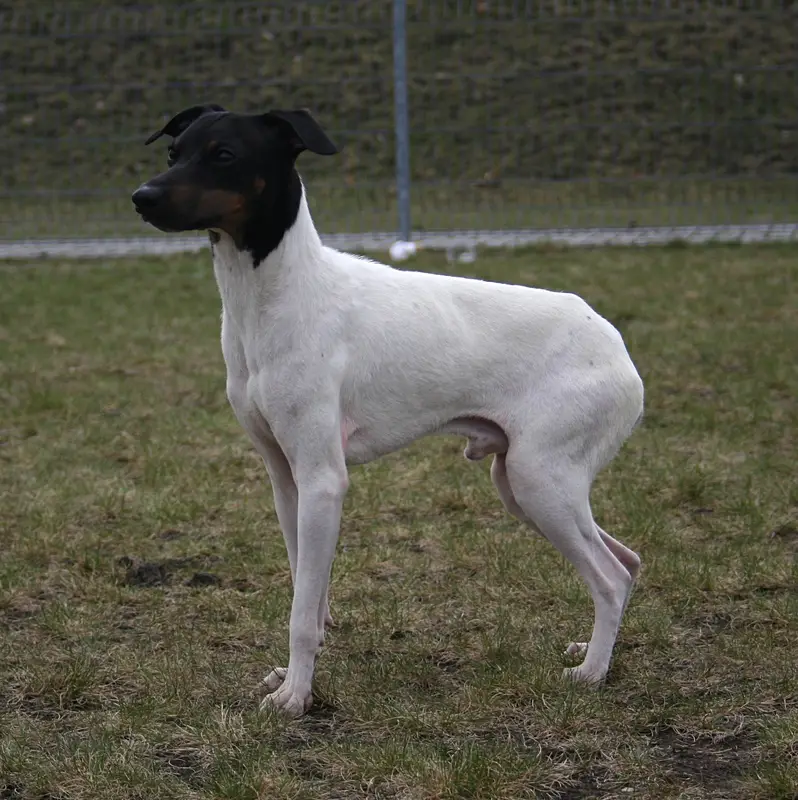Manchester Terrier
Also known as: Black and Tan Terrier, Gentleman's Terrier
The Manchester Terrier is a lively, intelligent breed known for its sleek appearance and strong hunting instincts. With a loving nature and high energy, they thrive in active households.
⚡At a glance
🏆Best traits
Key Facts
- Height
- 38-41 cm
- Weight
- 5-10 kg
- Life Span
- 15 - 17 years
- Group
- Terrier
- Origin
- England
- Shedding
- Very Low
- Exercise
- 30 min/day
- Best For
- Apartments, Families, Active Owners
Overview
🐕Breed Overview
✨Key Traits
💡What Makes Manchester Terrier Special
Manchester Terriers are known for their agility and sleek appearance, making them one of the most elegant terrier breeds. Their keen intelligence allows them to excel in training and canine sports, while their strong prey drive reflects their historical role as vermin hunters.
They are devoted companions, often displaying loyalty and affection towards their families. Their independent nature can sometimes make training a challenge, but with consistent guidance, they can learn a variety of commands and tricks.
Their playful demeanor and energetic personality make them a joy to have in active households, although they may not be the best fit for homes with small pets due to their instinctual hunting behavior.
The Manchester Terrier is a small to medium-sized breed known for its sleek appearance and lively personality. Originating in England, this breed is a descendant of the black and tan terrier, with a rich history as a skilled vermin hunter. With a height of 15 to 16 inches and a weight ranging from 12 to 22 pounds, the Manchester Terrier is compact yet agile, making it well-suited for various living environments.
Their distinctive black and mahogany tan coat is smooth and glossy, requiring minimal grooming. Known for their high energy levels, these dogs thrive on daily exercise, including walks and playtime in secure areas. Their temperament is observant and independent, often forming a strong bond with one particular family member while remaining reserved with strangers.
Despite their hunting instincts, Manchester Terriers are affectionate companions, making them ideal pets for active families. Their intelligence and trainability allow them to excel in various canine sports, but they require consistent training and socialization to manage their independent nature. With a lifespan of 15 to 17 years, the Manchester Terrier is a devoted and loyal companion that brings joy and energy to any household.
🎉Fun Facts
Described as 'catlike' due to their cleanliness and independent nature.
Known for their incredible appetites, often jokingly said to eat anything that doesn't eat them first.
They have a strong prey drive, making them excellent vermin hunters.
Breed Characteristics
Family & Friends
Good Behavior
Get Up & Go
Household Harmony
Temperament & Personality
✨Key Traits
🐕Core Temperament
The Manchester Terrier is characterized by its observant and independent temperament. They are devoted to their families and often form a strong bond with one particular person.
While they are playful and affectionate, they can be reserved with strangers, making early socialization important. Their hunting instincts are strong, and they may exhibit behaviors such as chasing small animals or digging.
With proper training and socialization, they can be well-mannered companions. Their intelligence and eagerness to please make them relatively trainable, although they may require consistent reinforcement to manage their independent streak.
💫Personality Profile
The Manchester Terrier is a lively and intelligent breed, characterized by its observant and independent nature. They are known for forming strong bonds with their families, often favoring one person in particular.
While they are playful and affectionate with their loved ones, they tend to be reserved around strangers. Their high energy levels make them active companions, and they thrive on interactive play and exercise.
Despite their hunting instincts, they can adapt well to home life, provided they receive adequate mental and physical stimulation. Some individuals may exhibit digging behavior, a trait common among terriers, especially when bored or seeking entertainment.
🔊Vocal Tendencies
Manchester Terriers are generally not excessive barkers, but they will alert their owners to any unusual sounds or intruders. Their barking tends to be moderate, and they may vocalize when excited or during play.
While they are observant and can be protective of their families, they do not typically bark excessively without reason. Their vocalizations can vary based on their mood and environment, with some individuals being more vocal than others.
Overall, they are not known for being overly noisy dogs, making them suitable for various living situations.
Affection & Social Traits
Warm and balanced socially — here’s how it shows up day to day.
Energy & Activity
High-octane companion — great for matching your routine.
Communication Style
Generally quiet — a quick read on noise at home.
Care Requirements
🏃♂️Exercise Requirements
Daily Exercise
The Manchester Terrier requires a moderate amount of daily exercise to maintain its health and happiness. Ideally, this breed should engage in at least 30 to 60 minutes of exercise each day.
This can include a combination of leashed walks, off-lead play in a secure area, and interactive games like fetch or agility training. Puppies may need shorter, more frequent play sessions, while senior dogs may benefit from gentler activities.
Regular exercise is crucial for preventing obesity, managing energy levels, and reducing behavioral issues such as digging or excessive barking. Insufficient exercise can lead to weight gain, anxiety, and destructive behaviors, so it's important for owners to provide consistent physical and mental stimulation.
Preferred Activities
🏠Living & Adaptability
Space Requirements
Manchester Terriers are adaptable and can thrive in various living environments, including apartments and houses with small or large yards. However, they do require a secure outdoor space to run and play freely.
Owners in smaller living situations should ensure their dog receives adequate exercise through regular walks and playtime. The breed's size and energy level make it suitable for urban living, but they should not be confined for long periods, as this may lead to anxiety or destructive behavior.
Climate Preference
🍲Feeding Guide
Schedule
Food Types
Portion Size
Special Nutritional Needs
Manchester Terriers do not have specific dietary restrictions, but it's important to provide a balanced diet rich in protein and essential nutrients. Monitor for any food sensitivities, and consider consulting with a veterinarian for tailored dietary recommendations.
✨Grooming Requirements
Grooming Overview
The Manchester Terrier has a short, smooth coat that requires minimal grooming. Regular brushing with a soft-bristle brush will help remove loose hair and keep the coat shiny.
Bathing should be done as needed, typically every few months or when the dog gets particularly dirty. Pay attention to nail trimming, ear cleaning, and dental care to maintain overall health.
The breed's low grooming needs make it a convenient choice for busy owners.
Care Schedule
Brush weekly, bathe as needed, trim nails every 2-4 weeks.
Health Profile
⚕️Health Care
Regular health care is crucial for the Manchester Terrier's longevity. Routine veterinary check-ups, vaccinations, and preventive treatments can help detect and address health issues early.
Maintaining a balanced diet, providing regular exercise, and ensuring proper dental care are essential practices that contribute to the overall health and lifespan of this breed. Owners should also be vigilant about monitoring their dog's weight and activity levels to prevent obesity-related health problems.
Health Issues Overview
⏳Average Lifespan
Genetic Factors
Genetics play a significant role in the Manchester Terrier's lifespan, with certain hereditary health issues being more prevalent in the breed. Responsible breeding practices that prioritize genetic diversity can help reduce the risk of inherited conditions. Potential owners should seek reputable breeders who conduct health screenings and provide health clearances for both parent dogs to ensure the best possible genetic background for their new pet.
Living Conditions
The Manchester Terrier thrives in environments that provide ample opportunities for exercise and social interaction. A secure outdoor space is essential for their physical activity, while a warm and comfortable indoor environment supports their well-being. Exposure to various stimuli and socialization with other dogs and people can enhance their adaptability and reduce anxiety, contributing positively to their lifespan.
🏥Common Health Issues
Hypothyroidism
Warning Signs
🔬Diagnosis
Blood tests to measure thyroid hormone levels.
💊Treatment
Thyroid hormone replacement therapy.
📝Management Tips
Regular veterinary check-ups, medication as prescribed, and a balanced diet.
Patellar Luxation
Warning Signs
🔬Diagnosis
Physical examination and X-rays.
💊Treatment
Surgery to correct the alignment.
📝Management Tips
Weight management, physical therapy, and in severe cases, surgical intervention.
Von Willebrand Disease (vWD)
Warning Signs
🔬Diagnosis
Blood tests to assess clotting ability.
💊Treatment
Management of bleeding episodes and supportive care.
📝Management Tips
Avoidance of trauma, regular veterinary check-ups, and potential blood transfusions in emergencies.
🛡️Preventive Care
🔬Thyroid Evaluation
This test assesses the dog's thyroid hormone levels to detect hypothyroidism, a common condition in the breed.
📅 Annually after the age of 5 years.
🔬DNA Test for vWD
This test evaluates the dog's ability to clot blood and detect von Willebrand Disease, which can lead to excessive bleeding.
📅 Before any surgical procedures or if bleeding issues arise.
🔬Ophthalmic Examination
This test checks for common eye conditions that may affect the breed, ensuring early detection and management.
📅 Every 1-2 years, especially in older dogs.
Training
🧠Intelligence & Trainability
💪Work Drive
Manchester Terriers have a strong work drive due to their history as hunting and vermin control dogs. They thrive when given tasks or jobs to do, such as participating in agility training, earthdog trials, or even simple games of fetch.
Mental stimulation is just as important as physical exercise for this breed, as it helps prevent boredom and associated behavioral issues. Engaging them in activities that challenge their intelligence will keep them happy and fulfilled.
⚠️Training Considerations
Manchester Terriers can exhibit behavioral challenges such as stubbornness and a strong prey drive, which may lead them to chase small animals. To overcome these challenges, consistent training and socialization from a young age are essential.
Positive reinforcement techniques work well with this breed, as they respond better to rewards than harsh corrections. Engaging them in activities that stimulate their minds, such as puzzle toys or obedience training, can help mitigate their independent streak and keep them focused.
📝Training Tips
Training a Manchester Terrier requires patience and consistency. Start with basic obedience commands and gradually introduce more complex tasks.
Socialization is crucial; expose your dog to various people, environments, and other animals to help them become well-rounded. Use positive reinforcement methods, such as treats and praise, to encourage good behavior.
Short, engaging training sessions are more effective than long, tedious ones. Incorporating play into training can also help maintain their interest and enthusiasm.
History & Heritage
📜Origin Story
The Manchester Terrier's origin is deeply rooted in the need for effective vermin control during a time of poor sanitation in England. As rat populations surged, the demand for skilled ratters grew.
John Hulme, a key figure in the breed's development, sought to create a dog that could excel in both ratting and coursing. By crossing the black and tan terrier with the whippet, he produced a dog that was not only tenacious but also elegant.
The breed quickly gained popularity, particularly in Manchester, where it became known for its agility and hunting prowess.
⏳Development History
The Manchester Terrier traces its roots back to the black and tan terrier, which was prevalent in England by the 16th century. The breed was developed in Manchester during the early 19th century, primarily for ratting and rabbit hunting.
John Hulme, an enthusiast of rat-baiting, crossed the black and tan terrier with the whippet to create a more agile and streamlined dog. By 1860, the breed was officially recognized as the Manchester Terrier.
In 1959, the breed was classified into two varieties: the standard and the toy Manchester Terrier, allowing for interbreeding between the two. This classification helped preserve the breed's characteristics while accommodating different size preferences.
🛡️Purpose & Historical Role
Originally bred for ratting and rabbit hunting, the Manchester Terrier has evolved into a beloved companion dog. Its agility and keen hunting instincts make it well-suited for earthdog trials and other canine sports. The breed's history as a vermin control dog has shaped its strong prey drive, while its affectionate nature has made it a loyal family pet.
🏺Cultural Significance
The Manchester Terrier has played a significant role in English history, particularly in the 19th century when it was used for ratting and as a companion for the working class. The breed's association with ratting contests made it a popular choice among factory workers and miners in Manchester, England.
Over time, the breed gained recognition among the upper classes, who appreciated its elegance and intelligence. Today, the Manchester Terrier is celebrated for its loyalty and companionship, making it a cherished pet in many households.
Conservation Status
The breed exists today and isn’t classified as extinct.
Less widespread; more likely to be region-specific or niche.
This breed is less common but has stable populations in certain regions.
?Frequently Asked Questions
Is the Manchester Terrier good for apartment living?
Yes, the Manchester Terrier generally does well in apartments. They adapt comfortably to smaller spaces and can thrive with regular walks and indoor play. Their temperament and energy level make them a good fit for apartment living, though they still need daily exercise.
How much does a Manchester Terrier shed?
The Manchester Terrier is a very low-shedding breed, making them an excellent choice for people who prefer minimal pet hair around the home. Regular grooming is still recommended to keep their coat healthy, but you won't find much fur on your furniture.
Are Manchester Terriers easy to train?
The Manchester Terrier can be moderate when it comes to training. They can learn commands and routines with consistent effort, though they may sometimes show a stubborn streak. Patience, positive reinforcement, and regular practice sessions will yield the best results.
How long do Manchester Terriers live?
The average lifespan of a Manchester Terrier is 15 - 17 years. Lifespan can be influenced by genetics, diet, exercise, and overall health care. Regular veterinary check-ups and a healthy lifestyle can help your Manchester Terrier live a long and happy life.
Is the Manchester Terrier good with kids?
Yes, the Manchester Terrier generally does well with children. They are patient and affectionate, making them a solid family dog. As with any breed, supervision during interactions with young children is always recommended.
How much exercise does a Manchester Terrier need?
The Manchester Terrier is a high-energy breed that needs approximately 30 minutes of exercise daily. They thrive with vigorous activities such as running, hiking, or interactive games. Without adequate exercise, they may develop behavioral issues from pent-up energy.
Is the Manchester Terrier good with other pets?
No, the Manchester Terrier is not typically recommended for multi-pet households. They may have a strong prey drive or territorial instincts that make coexistence with other animals difficult. Single-pet homes are generally a better fit.









